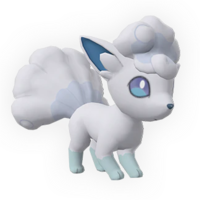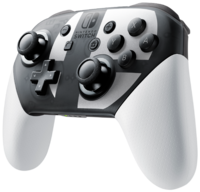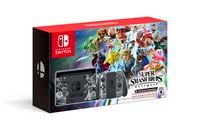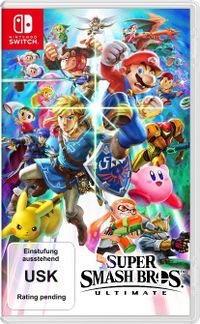Super Smash Bros. Ultimate
This article is about an upcoming game. Editors must cite sources for all contributions to this article. Edits that do not follow this standard may be reverted without notice.
Do not upload any leaked images or media files before this game is released. Per our policy, any such files will be immediately deleted.
- "SSBU" redirects here. For this game's Wii U predecessor, see Super Smash Bros. for Wii U.
Template:Infobox Super Smash Bros. Ultimate[1] is an upcoming game in the Super Smash Bros. series for the Nintendo Switch. The game was announced through a teaser trailer in the March 2018 Nintendo Direct[2], and is set to be released on December 7, 2018.
Gameplay
Super Smash Bros. Ultimate retains the series' basic gameplay elements, with several new mechanics and changes. As with previous installments, the objective of the game is to launch opponents off the stage. Players build each other's damage percentage through attacks, and the higher the percentage, the farther they fly when they are hit. This time, the damage count is in decimal notation, adding a tenth to the number. Additionally, when an opponent is launched, their launch speed is the fastest at the start, unlike in previous games in the series. During 1-on-1 battles, all fighters' attacks deal 1.2x their regular damage and knockback, which is done to "increase gameplay speed."[1] Additionally, characters can use any ground attack out of a run (e.g. standard attacks, tilt attacks, smash attacks), while any aerial attack can be used while climbing a ladder, officially known as a "ladder attack".
Three techniques are also introduced in Super Smash Bros. Ultimate: the Directional Air Dodge, Short-Hop Attack, and Perfect Shield. The Directional Air Dodge, a technique carried over from Super Smash Bros. Melee, allows the player to dodge while moving at the direction they tilt , which can also be used for recovery. However, if a player dodges excessively - in the air or on the ground - they become more vulnerable to attacks, and their dodge range becomes shorter as well. The Short-Hop Attack is performed by pressing the attack and jump buttons at the same time, allowing the player to hop a short distance off the ground while performing an air attack; however, all short-hopped aerial attacks deal 0.85x their regular damage. The Perfect Shield can be performed by releasing the shield button just as an opponent attack lands, nullifying the attack.[1]
During a match, the fighter that is in the lead occasionally emits a glimmer of light. If a match enters Sudden Death, unlike in previous games where Bob-ombs begin to drop after a period of time, the screen slowly zooms in on the center of the stage, shrinking the field of view and stage boundary and thereby making it easier for fighters to be KO'd. The Sudden Death mode is visually accompanied by flames that intensify as the screen zooms in on the stage.[3]
As with Super Smash Bros. for Wii U, Super Smash Bros. Ultimate also supports Nintendo GameCube controllers.[1]
Super Smash Bros. Ultimate will be available in 11 different languages: Japanese, English, French, Spanish, German, Italian, Dutch, Russian, Simplified Chinese, Traditional Chinese, and Korean.
Smash
Before starting a match, the player can create their own preset rules, such as the number of stocks and time limit, which they can quickly select at any time. In addition to Time and Stock modes, Stamina mode is now a standard mode alongside the aforementioned two, and no longer a part of Special Smash. Stocks can also be added to Stamina modes.[3]
8-Player Smash also returns from Super Smash Bros. for Wii U, and can now be played on any stage from the start.[1][3]
A new rule option added to Super Smash Bros. Ultimate is the Final Smash Meter, which appears below each fighter's damage meter and fills up as the player takes damage from opponent attacks, similar to Little Mac's Power Meter. Once it is full, the player can then use a Final Smash. These Final Smashes are weaker than regular Final Smashes obtained from Smash Balls, and like them, only one can be used at a time.[3]
Squad Strike
Squad Strike (Japanese: 団体戦 Dantaisen, Team Competition) is an elimination-style battle mode added to Super Smash Bros. Ultimate. The player can choose between 3-on-3 or 5-on-5 Squad Strikes, which can be carried out with one player on each side playing as three or five characters, or three or five players on each side each playing as one character. In a Squad Strike, both sides battle each other as the three or five characters consecutively in one battle.[3]
Tourney
Tourney returns from Super Smash Bros. Brawl, allowing up to 32 participants to compete. After selecting the number of total participants, number of CPU players and tourney type, the game automatically generates a tournament bracket.[3]
Special Smash
In a new Special Smash mode, Smashdown (Japanese: 全員バトル Zen'in Batoru, All-Members Battle), players enter a series of matches selecting a character for each one. After one match ends, however, the characters used in that match are no longer available for subsequent matches, forcing players to select a different character for the next one.[3]
Classic
Classic mode returns from previous installments, returning to its original format last seen in Super Smash Bros. Brawl, in which the player fights multiple opponents in a linear series of matches to reach the end. This time, each fighter has a set series of opponents to face.[3]
Training
Training mode lets players practice and experiment with characters' moves, items and the CPU as well as manipulate gameplay elements (such as game speed and damage), also returning from previous installments. The mode now features an exclusive numbered, grid-like stage, which allows the player to measure distances such as jump height and projectile range. In addition, attacking the CPU fighter with a strong attack shows the trajectory at which they are launched in the form of a green curve, compared with the trajectory if they were launched at 0% damage (a red curve) and 100% damage (a blue curve).[3]
Playable characters
In addition to introducing new characters, Super Smash Bros. Ultimate features every previously playable character in the series. Counting Pokémon Trainer and his/her Pokémon as a single fighter and the three Mii Fighter types separately, a total of 72 fighters, including six Echo Fighters (characters whose movesets and basic attributes are mostly identical to that of another character, and are represented by an epsilon symbol "ε"), have been confirmed to appear in Super Smash Bros. Ultimate. The number beside each playable character (excluding Echo Fighters) signifies the order in which they were announced to be playable in the Super Smash Bros. series; in the case of the unlockable characters from Super Smash Bros. Melee, their order is based on the number of Vs. matches required to unlock them in that game. The starting roster has been implied to be as small as that of the original Super Smash Bros., while the rest of the characters have to be unlocked.[1] It is also unknown if the first game's unlockables are starters or unlockables.
Veterans
01 Mario

02 Donkey Kong

03 Link

04 Samus

05 Yoshi

06 Kirby

07 Fox

08 Pikachu

09 Luigi

10 Ness

12 Jigglypuff

13 Peach

14 Bowser

15 Ice Climbers

16 Sheik

17 Zelda

18 Dr. Mario

19 Pichu

20 Falco

21 Marth

21ε Lucina

22 Young Link

23 Ganondorf

24 Mewtwo

25 Roy

27 Meta Knight

28 Pit

28ε Dark Pit

30 Wario

31 Snake
32 Ike

33/34/35 Pokémon Trainer

33 Squirtle

(with Pokémon Trainer)34 Ivysaur

(with Pokémon Trainer)35 Charizard

(with Pokémon Trainer)36 Diddy Kong

37 Lucas

38 Sonic

39 King Dedede

41 Lucario

42 R.O.B.

43 Toon Link

44 Wolf

45 Villager

46 Mega Man

49 Little Mac

50 Greninja

51/52/53 Mii Fighters

51 Mii Brawler

53 Mii Gunner

54 Palutena

55 Pac-Man

56 Robin

57 Shulk

58 Bowser Jr.

(with Koopalings model swaps)[5]59 Duck Hunt

60 Ryu

61 Cloud

62 Corrin

63 Bayonetta

Newcomers
Twelve newcomers (five being Echo Fighters) have currently been confirmed for Super Smash Bros. Ultimate.[1][3]
04ε Dark Samus

13ε Daisy

25ε Chrom

60ε Ken

65 Ridley

66 Simon
66ε Richter
67 King K. Rool

69 Incineroar
 [7]
[7]
70 Piranha Plant*
 [8]
[8]
*DLC character
Stages
Unlike in previous installments, stages are selected before characters in Super Smash Bros. Ultimate. All stages can not only be played in their Final Destination form (known as Omega (Ω) form) as in Super Smash Bros. for Nintendo 3DS / Wii U, but also in a new Battlefield form, which adds three floating, pass-through platforms.[1] Like the original Final Destination and Battlefield, in both forms for all stages, the stage is set on a large platform floating over an abyss, as opposed to a large pillar with walls leading down to the bottom as is the case with several Omega stages in the previous installments. The player is also given the option to turn off stage hazards.
A new feature added to Super Smash Bros. Ultimate is Stage Morph, which causes the stage on which players are currently fighting to transform into another stage in the middle of the match. The player can choose two stages for this function, and can also set the frequency at which they transform between each other.[3]
Currently, there are 103 stages set to appear in the game, all of which will be available from the start.[3] The following list is sorted by the original Super Smash Bros. games in which they first appear.
New
Super Smash Bros.
Super Smash Bros. Melee
Super Smash Bros. Brawl
Super Smash Bros. for Nintendo 3DS / Wii U
Nintendo 3DS version
Wii U version
Items
New
Returning
Assist Trophies
New
Returning
Poké Ball Pokémon
New
- Abra[35]
- Alolan Exeggutor[3]
- Alolan Raichu[32]
- Alolan Vulpix[39]
- Bewear
- Ditto[3]
- Lunala[10]
- Marshadow[3]
- Mimikyu[3]
- Pyukumuku[3]
- Solgaleo
- Togedemaru[44]
- Vulpix[3]
Returning
amiibo
It has been confirmed that all previously released amiibo that relate to the playable characters are usable in Super Smash Bros. Ultimate.[1] In addition to this, more amiibo of fighters in Super Smash Bros. Ultimate are set to be released in the Super Smash Bros. line. The following fighters are confirmed to have Super Smash Bros. amiibo based on them to be released:
- Ice Climbers[citation needed]
- Pichu[citation needed]
- Wolf[47]
- Inkling (Inkling Girl)[47]
- Daisy[48]
- Ridley[47]
- Simon[49]
- Richter[49]
- Chrom[49]
- Dark Samus[49]
- King K. Rool[49]
Release
A Super Smash Bros. Ultimate-themed Nintendo Switch Pro Controller will be available at launch, which can be purchased individually or as part of a bundle that also includes the game and a black steel case with the flaming Super Smash Bros. emblem seen in the game's March 2018 teaser.[50][51] A silver 1.5" coin will also be included in the bundle as a bonus item when purchased at Best Buy.[52]
A bundle containing a specially designed Nintendo Switch console and a download code for the game will be released on November 2, 2018. The console features a design of the original eight Super Smash Bros. series characters on the front of the dock, as well as the Super Smash Bros. symbol printed across the Joy-Con. A Super Smash Bros. Ultimate-edition Nintendo GameCube Controller and the GameCube Controller Adapter previously released for Super Smash Bros. for Wii U will also release on the same day.[6]
Pre-release and unused content
Final Destination in the E3 demo was simply the Omega version of Battlefield, as the final design was not revealed at the time. Also, Ridley has an alternate costume based off of Meta Ridley, but it was not present in the demo, with one of the costumes potentially being a placeholder.
References to other games
- Wrecking Crew: A new medley of the main background music and Golden Hammer theme from this game appears in Super Smash Bros. Ultimate.[3]
- Super Mario Bros. / Super Mario Bros.: The Lost Levels: One of Simon Belmont's teaser screencaps depicts him about to use his Axe special attack on Bowser, indirectly alluding to how Bowser in the classic games was defeated with an axe destroying the bridge.
- Super Mario Bros. 3: Arrangements of the regular boss battle theme and Bowser's battle theme appear in the game.[53][54]
- Wario Land: Super Mario Land 3: Wario's Dash Attack that debuted in this game now appears as his new dash attack. Wario's down throw now reflects the animation of the Ground Pound that debuted in this game as well.
- Donkey Kong Country: One of K. Rool's attacks involves throwing his crown as a boomerang, like in this game. A Klaptrap appears as an Assist Trophy, having the same behavior as in this game. A medley of "Bonus Room Blitz" (the Bonus Area theme) and "Simian Segue" (the map theme) and an arrangement of "Gang-Plank Galleon" appear in the game. In addition, King K. Rool's gameplay trailer's opening segment features him aboard a ship in a reference to Gangplank Galleon.
- Donkey Kong Country 2: Diddy's Kong Quest: One of K. Rool's attacks involves shooting with the blunderbuss he has in this game, and when he does so he dons a pirate hat like in his appearance as Kaptain K. Rool.
- Donkey Kong Country 3: Dixie Kong's Double Trouble!: One of K. Rool's attacks involves using his helicopter pack from this game.
- Donkey Kong 64: One of K. Rool's attacks involves using his boxing gloves from this game, and his Final Smash recreates the Game Over scene involving the Blast-o-Matic being fired from Crocodile Isle at Donkey Kong Island.
- Luigi's Mansion / Luigi's Mansion: Dark Moon: Simon Belmont's debut trailer has Luigi being present in Dracula's Castle and attempting to ward off various ghostly creatures inside, alluding to the premise of the games. A new arrangement of the main theme from the former game appears in Super Smash Bros. Ultimate.[55]
- Super Smash Bros. Melee: In the Template:Media link, Luigi is seen doing the Green Missile above the other characters, just like in the Template:Media link from this game.
- Super Mario Sunshine: An arrangement of Delfino Plaza's music appears in the game.
- Donkey Kong Jungle Beat: Donkey Kong's Final Smash is based on his combo punch attacks in this game.
- Donkey Konga: King K. Rool's opening animation is taken from this game.
- Dance Dance Revolution: Mario Mix: Mario's down smash animation has been changed from the Sweep Kick to his breakdance from this game.
- Mario Kart 7: One of Daisy's taunts matches the artwork pose she originally had from this game.
- Yoshi's New Island: An arrangement of this game's main theme appears in Super Smash Bros. Ultimate.[54]
- Mario Golf: World Tour: One of Daisy's victory animations is inspired by her birdie animation from this game.
- Super Mario Maker: Mario has a new costume based on his builder outfit from this game.
- Super Mario Odyssey: Cappy makes an appearance as Mario's cap; one of Mario's new taunts features him tossing Cappy. Occasionally, Mario's Super Jump Punch will feature the regional coins found in the Metro Kingdom in place of the standard coins, and plays the same sound effect as the one that plays when a new regional coin is collected. New Donk City Hall appears as a stage. Mario has a new costume based on his wedding tuxedo.
- Luigi's Mansion 3: Luigi's new Poltergust was first shown off during Simon and Richter's reveal trailer, boasting its new design and the ability to fire plungers. Luigi uses his Poltergust in his throws.
- Yoshi's Crafted World: Yoshi has a new costume based on his appearance from this game.
Gallery
- For this subject's image gallery, see Gallery:Super Smash Bros. Ultimate.
Names in other languages
| Language | Name | Meaning | Notes |
|---|---|---|---|
| Japanese | 大乱闘スマッシュブラザーズ Special[?] Dairantō Sumasshu Burazāzu Supesharu |
Great Melee Smash Brothers Special | |
| Chinese | 任天堂明星大亂鬥 特別版 (Traditional) 任天堂明星大乱斗 特别版 (Simplified)[?] Rèntiāntáng Míngxīng Dàluàndòu Tèbiébǎn |
Nintendo Stars Great Melee: Special Edition | |
| Korean | 슈퍼 스매시브라더스 얼티밋[?] Syupeo Seumaesi Beuradeoseu Eoltimit |
Super Smash Brothers Ultimate |
Trivia
- On the German cover for the game, Yoshi was omitted from the boxart in order to fit the USK rating in the bottom left corner, while Pikachu, who was placed lower than Yoshi, was moved up due to its greater popularity.[56]
- Super Smash Bros. Ultimate is the seventh Mario-related game to receive a PEGI 12+ rating in Europe, being preceded by the four prior Super Smash Bros. installments and the Virtual Console releases of Super Mario 64 DS and New Super Mario Bros.
- Decimals have always been used for damage calculations since Super Smash Bros. Melee, but they were rounded to an integer on-screen. Super Smash Bros. Ultimate is the first time that decimal notations are shown in-game.
References
- ^ a b c d e f g h i j Nintendo. (June 13, 2018). Nintendo Direct: E3 2018 YouTube. Retrieved June 13, 2018.
- ^ Twitter - Nintendo of America Retrieved on March 8, 2018.
- ^ a b c d e f g h i j k l m n o p q r s t u v w x y z aa ab ac ad ae af ag ah ai aj Nintendo. (August 8, 2018). Super Smash Bros. Ultimate Direct 8.8.2018 YouTube. Retrieved August 8, 2018.
- ^ Olimar's character trailer
- ^ Bowser Jr.'s page character trailer
- ^ a b Nintendo. (September 13, 2018). Nintendo Direct 9.13.2018. YouTube. Retrieved September 13, 2018.
- ^ https://www.youtube.com/watch?v=fccgHnBQ0YM
- ^ https://www.youtube.com/watch?v=fccgHnBQ0YM
- ^ File:New Donk City Smash.png
- ^ a b c d e f g h i j k l m n o p Nintendo. (June 12, 2018). Super Smash Bros. Ultimate Gameplay Pt. 1 - Nintendo Treehouse: Live | E3 2018. YouTube. Retrieved June 13, 2018.
- ^ Mii Fighter's page
- ^ a b Bowser character trailer
- ^ Daisy character trailer
- ^ Diddy Kong's page background image
- ^ Ridley's page background image
- ^ Falco's page background image
- ^ King Dedede's page
- ^ https://www.smashbros.com/en_US/blog/index.html?category=cat03_item_02
- ^ Mr. Game & Watch character trailer
- ^ Samus's page background image
- ^ Yoshi's page background image
- ^ Meta Knight's page background image
- ^ a b c R.O.B. character trailer
- ^ Ness's page
- ^ Duck Hunt's page
- ^ Bowser's page
- ^ Sheik's page background image
- ^ Dark Pit's page background image
- ^ Pit's page background image
- ^ Fox's page
- ^ Pac-Man's page background image
- ^ a b c d e f g h i j k l m n o p q r s t u v w Nintendo. (June 12, 2018). Super Smash Bros. Ultimate Gameplay Pt. 2 - Nintendo Treehouse: Live | E3 2018. YouTube. Retrieved June 13, 2018.
- ^ Nintendo. (June 15, 2018). Super Smash Bros. Ultimate Gameplay Pt. 8 - Nintendo Treehouse: Live | E3 2018. YouTube. Retrieved June 15, 2018.
- ^ a b c d e f g Nintendo. (June 13, 2018). Nintendo @ E3 2018: Day 2. YouTube. Retrieved June 14, 2018.
- ^ a b c d e f Nintendo. (June 12, 2018). Super Smash Bros. Ultimate Gameplay Pt. 3 - Nintendo Treehouse: Live | E3 2018. YouTube. Retrieved June 13, 2018.
- ^ a b Rage 2018 Summer - Ness vs. Mario - SSBU Demo. YouTube. Retrieved June 17, 2018.
- ^ a b Features | Super Smash Bros. Ultimate for the Nintendo Switch System | Official Site
- ^ Richter's page
- ^ a b c d e f g Super Smash Bros. Ultimate Invitational (FULL). YouTube. Retrieved June 14, 2018.
- ^ プレイ映像(2vs2/ステージ変化あり. YouTube. Retrieved August 21, 2018.
- ^ プレイ映像(2vs2/ステージ変化あり. YouTube. Retrieved August 21, 2018.
- ^ a b c Super Smash Bros. Ultimate - Squirtle vs. Marth. YouTube. Retrieved June 14, 2018.
- ^ GameXplain. (June 12, 2018). Super Smash Bros. Ultimate Gameplay - Ridley, Snake, Ganondorf, Pikachu on Battlefield. YouTube. Retrieved June 14, 2018.
- ^ a b GameXplain. (June 17, 2018). Super Smash Bros. Ultimate - 28 New & Returning Poké Ball Pokémon We've Seen So Far (+Stage Ones!). YouTube. Retrieved June 17, 2018.
- ^ a b Nintendo Treehouse Live - E3 2018 - Smash Bros. Ultimate #8. YouTube. Retrieved June 14, 2018.
- ^ GameXplain. (June 17, 2018). Super Smash Bros. Ultimate 1 vs 1 Gameplay - Inkling vs. Champion Link on Great Plateau Tower. YouTube. Retrieved June 17, 2018.
- ^ a b c Nintendo. (2018) [1] Australian amiibo Line-Up website. Retrieved October 18, 2018.
- ^ [2] Nintendo Treehouse @ E3 2018: Day 1. Retrieved October 26, 2018.
- ^ a b c d e Nintendo. (August 8, 2018) [3] Twitter post. Retrieved October 18, 2018.
- ^ Super Smash Bros. Ultimate Buy Page
- ^ Tweet by Nintendo of America
- ^ Best Buy. Super Smash Bros. Ultimate Special Edition - Nintendo Switch. Retrieved September 3, 2018.
- ^ Bowser's character trailer
- ^ a b Super Smash Bros. Ultimate Official Site (Music)
- ^ Luigi's character trailer
- ^ Iggy. (June 16, 2018). Yoshi Vanishes from Super Smash Bros. Ultimate's German Box Art. NintendoSoup. Retrieved June 16, 2018.
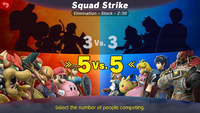
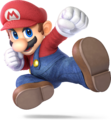
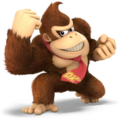
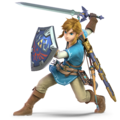
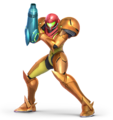
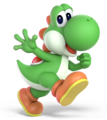

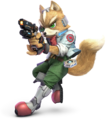
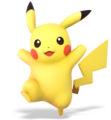
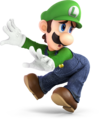

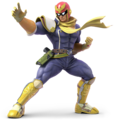
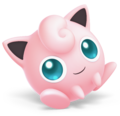

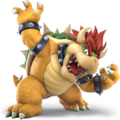
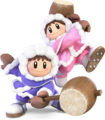
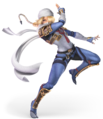
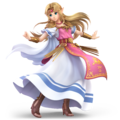

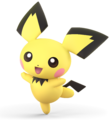
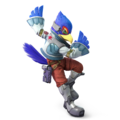
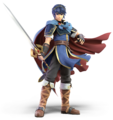
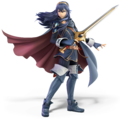
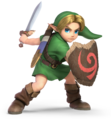
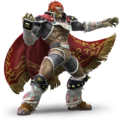
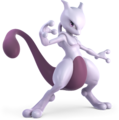
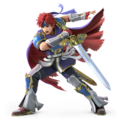
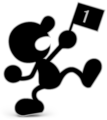
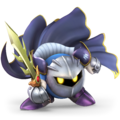
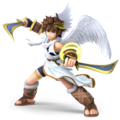
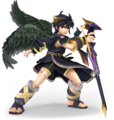
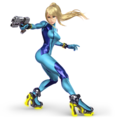
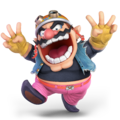

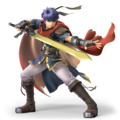

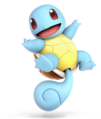
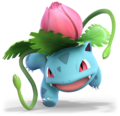
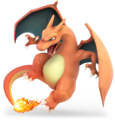
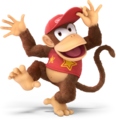

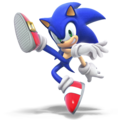
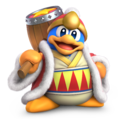
![40 Olimar (with Alph model swap)[4]](https://mario.wiki.gallery/images/thumb/b/b3/Olimar_SSBU.png/120px-Olimar_SSBU.png)

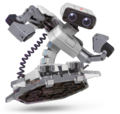
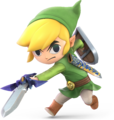
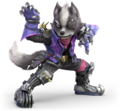
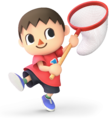
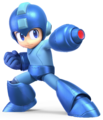

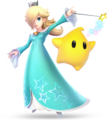
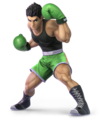
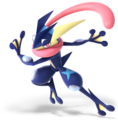

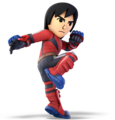
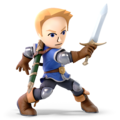
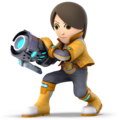
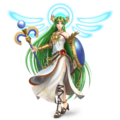
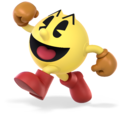
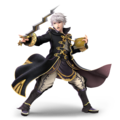
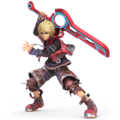
![58 Bowser Jr. (with Koopalings model swaps)[5]](https://mario.wiki.gallery/images/thumb/7/77/BowserJr_SSBU.png/107px-BowserJr_SSBU.png)

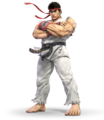
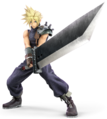
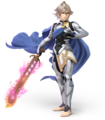
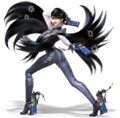
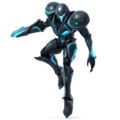
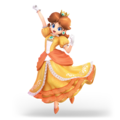
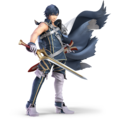
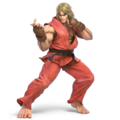
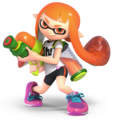
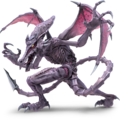
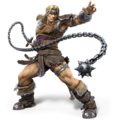
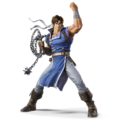
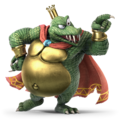
![68 Isabelle [6]](https://mario.wiki.gallery/images/thumb/2/2b/Isabelle_SSBU.png/120px-Isabelle_SSBU.png)
![69 Incineroar [7]](https://mario.wiki.gallery/images/thumb/c/c4/Incineroar_SSBU.png/120px-Incineroar_SSBU.png)
![70 Piranha Plant* [8]](https://mario.wiki.gallery/images/thumb/f/f0/Piranha_Plant_SSBU.png/120px-Piranha_Plant_SSBU.png)
![New Donk City Hall[9]](https://mario.wiki.gallery/images/thumb/a/a2/New_Donk_City_Hall_SSBU_entrance.png/120px-New_Donk_City_Hall_SSBU_entrance.png)


![Dracula's Castle[3]](https://mario.wiki.gallery/images/thumb/9/99/DraculasCastle1.jpg/120px-DraculasCastle1.jpg)

![Final Destination[10]](https://mario.wiki.gallery/images/thumb/c/ca/Final_Destination_light_BG_SSBU.png/120px-Final_Destination_light_BG_SSBU.png)



![Hyrule Castle[11]](https://mario.wiki.gallery/images/thumb/f/f7/Hyrule_Castle_SSBU.png/120px-Hyrule_Castle_SSBU.png)

![Dream Land[12]](https://mario.wiki.gallery/images/thumb/9/96/Dream_Land_SSBU.png/120px-Dream_Land_SSBU.png)
![Saffron City[10]](https://mario.wiki.gallery/images/thumb/f/f6/Saffron_City_SSBU.png/120px-Saffron_City_SSBU.png)


![Mushroom Kingdom II[13]](https://mario.wiki.gallery/images/thumb/6/6c/Mushroom_Kingdom_II_SSBU.png/120px-Mushroom_Kingdom_II_SSBU.png)

![Jungle Japes[14]](https://mario.wiki.gallery/images/thumb/9/9b/Jungle_Japes_SSBU.png/120px-Jungle_Japes_SSBU.png)


![Brinstar[15]](https://mario.wiki.gallery/images/thumb/e/e9/Brinstar_SSBU.png/120px-Brinstar_SSBU.png)






![Venom[16]](https://mario.wiki.gallery/images/thumb/f/f0/Venom_SSBU.jpg/120px-Venom_SSBU.jpg)
![Pokémon Stadium[17]](https://mario.wiki.gallery/images/thumb/a/ad/Pokemon_Stadium_SSBU.png/120px-Pokemon_Stadium_SSBU.png)
![Onett[10]](https://mario.wiki.gallery/images/thumb/b/be/Onett_SSBU.jpg/120px-Onett_SSBU.jpg)


![Delfino Plaza[18]](https://mario.wiki.gallery/images/thumb/4/47/Delfino_Plaza_SSBU.jpg/120px-Delfino_Plaza_SSBU.jpg)




![75m[19]](https://mario.wiki.gallery/images/thumb/1/1a/75m_SSBU.png/120px-75m_SSBU.png)


![Norfair[20]](https://mario.wiki.gallery/images/thumb/e/e2/Norfair_SSBU.png/120px-Norfair_SSBU.png)

![Yoshi's Island[21]](https://mario.wiki.gallery/images/thumb/f/f9/Yoshi%27s_Island_SSBU.png/120px-Yoshi%27s_Island_SSBU.png)
![Halberd[22]](https://mario.wiki.gallery/images/thumb/b/b2/HalberdUltimate.jpg/120px-HalberdUltimate.jpg)



![Port Town Aero Dive[23]](https://mario.wiki.gallery/images/thumb/b/b7/Port_Town_Aero_Dive_SSBU.png/120px-Port_Town_Aero_Dive_SSBU.png)



![Smashville[24]](https://mario.wiki.gallery/images/thumb/a/af/Smashville_SSBU.png/120px-Smashville_SSBU.png)


![Skyworld[10]](https://mario.wiki.gallery/images/thumb/c/cd/SkyworldUltimate.jpg/120px-SkyworldUltimate.jpg)



![Boxing Ring[10]](https://mario.wiki.gallery/images/thumb/c/c7/BoxingUltimate.jpg/120px-BoxingUltimate.jpg)

![Duck Hunt[25]](https://mario.wiki.gallery/images/thumb/d/d8/Duck_Hunt_SSBU.png/120px-Duck_Hunt_SSBU.png)

![Super Mario Maker[26]](https://mario.wiki.gallery/images/thumb/5/51/MakerUltimate.jpg/120px-MakerUltimate.jpg)
![Suzaku Castle[10]](https://mario.wiki.gallery/images/thumb/f/f4/SuzakuUltimate.jpg/120px-SuzakuUltimate.jpg)





![Gerudo Valley[27]](https://mario.wiki.gallery/images/thumb/a/a7/Gerudo_Valley_SSBU.png/120px-Gerudo_Valley_SSBU.png)







![Reset Bomb Forest[28]](https://mario.wiki.gallery/images/thumb/2/2d/ResetBombUltimate.jpg/120px-ResetBombUltimate.jpg)

![Balloon Fight[23]](https://mario.wiki.gallery/images/thumb/8/8f/Balloon_Fight_SSBU.png/120px-Balloon_Fight_SSBU.png)










![Kalos Pokémon League[12]](https://mario.wiki.gallery/images/thumb/8/80/Kalos_Pokemon_League_SSBU.png/120px-Kalos_Pokemon_League_SSBU.png)
![Coliseum[10]](https://mario.wiki.gallery/images/thumb/d/d4/Coliseum_SSBU.jpg/120px-Coliseum_SSBU.jpg)

![Palutena's Temple[29]](https://mario.wiki.gallery/images/thumb/b/b9/Palutena%27s_Temple_SSBU.png/120px-Palutena%27s_Temple_SSBU.png)


![Town and City[10]](https://mario.wiki.gallery/images/thumb/1/1a/Town_and_City_SSBU.jpg/120px-Town_and_City_SSBU.jpg)



![Wuhu Island[30]](https://mario.wiki.gallery/images/thumb/a/a0/Wuhu_Island_SSBU.jpg/120px-Wuhu_Island_SSBU.jpg)

![Pac-Land[31]](https://mario.wiki.gallery/images/thumb/f/ff/Pac-Land_SSBU.png/120px-Pac-Land_SSBU.png)
![Banana Gun[32][33]](https://mario.wiki.gallery/images/thumb/2/2a/BananaGunUltimate.png/120px-BananaGunUltimate.png)
![Black Hole[10]](https://mario.wiki.gallery/images/thumb/1/1c/BlackHoleUltimate.png/120px-BlackHoleUltimate.png)
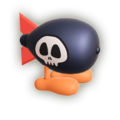
![Death's Scythe[3]](https://mario.wiki.gallery/images/thumb/3/34/DeathScytheUltimate.png/116px-DeathScytheUltimate.png)
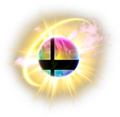
![Healing Field[1]](https://mario.wiki.gallery/images/thumb/4/45/HealingFieldUltimate.png/120px-HealingFieldUltimate.png)
![Killing Edge[3]](https://mario.wiki.gallery/images/thumb/1/1f/KillingEdgeUltimate.png/111px-KillingEdgeUltimate.png)
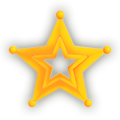
![Rage Blaster[3]](https://mario.wiki.gallery/images/thumb/b/ba/RageBlasterUltimate.png/120px-RageBlasterUltimate.png)
![Ramblin' Evil Mushroom[3]](https://mario.wiki.gallery/images/thumb/4/4c/EvilMushroomUltimate.png/120px-EvilMushroomUltimate.png)
![Staff[3]](https://mario.wiki.gallery/images/thumb/0/02/StaffUltimate.png/113px-StaffUltimate.png)
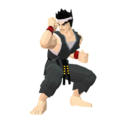
![Alucard[3]](https://mario.wiki.gallery/images/thumb/d/d2/AlucardUltimate.png/120px-AlucardUltimate.png)
![Arcade Bunny[32]](https://mario.wiki.gallery/images/thumb/2/26/ArcadeUltimate.png/120px-ArcadeUltimate.png)
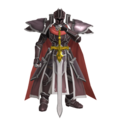
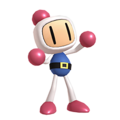
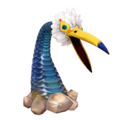
![Chef Kawasaki[3]](https://mario.wiki.gallery/images/thumb/4/4e/ChefUltimate.png/120px-ChefUltimate.png)

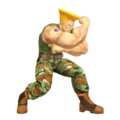
![Kapp'n[3]](https://mario.wiki.gallery/images/thumb/0/0e/KappnUltimate.png/120px-KappnUltimate.png)
![Klaptrap[3]](https://mario.wiki.gallery/images/thumb/9/9d/SSBU_Klaptrap_artwork.png/120px-SSBU_Klaptrap_artwork.png)
![Knuckles[32]](https://mario.wiki.gallery/images/thumb/0/06/KnucklesUltimate.png/120px-KnucklesUltimate.png)
![Krystal[32]](https://mario.wiki.gallery/images/thumb/f/fc/KrystalUltimate.png/120px-KrystalUltimate.png)
![Moon[3]](https://mario.wiki.gallery/images/thumb/1/18/MoonUltimate.png/120px-MoonUltimate.png)
![Nikki[3]](https://mario.wiki.gallery/images/thumb/0/08/NikkiUltimate.png/120px-NikkiUltimate.png)
![Rathalos[3]](https://mario.wiki.gallery/images/thumb/d/d9/RathalosUltimate.png/120px-RathalosUltimate.png)
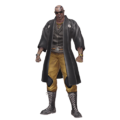
![Shovel Knight[3]](https://mario.wiki.gallery/images/thumb/8/8b/ShovelUltimate.png/120px-ShovelUltimate.png)
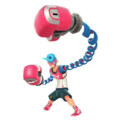

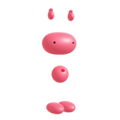
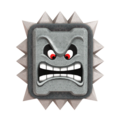
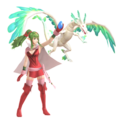
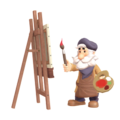
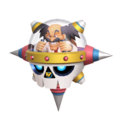
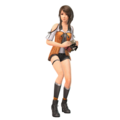
![Zero[3]](https://mario.wiki.gallery/images/thumb/2/25/ZeroUltimate.png/120px-ZeroUltimate.png)
